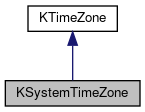KDECore
KSystemTimeZone Class Reference
#include <ksystemtimezone.h>
Inheritance diagram for KSystemTimeZone:

Public Member Functions | |
| KSystemTimeZone (KSystemTimeZoneSource *source, const QString &name, const QString &countryCode=QString(), float latitude=UNKNOWN, float longitude=UNKNOWN, const QString &comment=QString()) | |
| ~KSystemTimeZone () | |
 Public Member Functions inherited from KTimeZone Public Member Functions inherited from KTimeZone | |
| KTimeZone () | |
| KTimeZone (const QString &name) | |
| KTimeZone (const KTimeZone &tz) | |
| virtual | ~KTimeZone () |
| QByteArray | abbreviation (const QDateTime &utcDateTime) const |
| QList< QByteArray > | abbreviations () const |
| QString | comment () const |
| QDateTime | convert (const KTimeZone &newZone, const QDateTime &zoneDateTime) const |
| QString | countryCode () const |
| int | currentOffset (Qt::TimeSpec basis=Qt::UTC) const |
| const KTimeZoneData * | data (bool create=false) const |
| virtual bool | hasTransitions () const |
| virtual bool | isDst (time_t t) const |
| virtual bool | isDstAtUtc (const QDateTime &utcDateTime) const |
| bool | isValid () const |
| float | latitude () const |
| QList< LeapSeconds > | leapSecondChanges () const |
| float | longitude () const |
| QString | name () const |
| virtual int | offset (time_t t) const |
| virtual int | offsetAtUtc (const QDateTime &utcDateTime) const |
| virtual int | offsetAtZoneTime (const QDateTime &zoneDateTime, int *secondOffset=0) const |
| bool | operator!= (const KTimeZone &rhs) const |
| KTimeZone & | operator= (const KTimeZone &tz) |
| bool | operator== (const KTimeZone &rhs) const |
| bool | parse () const |
| QList< Phase > | phases () const |
| KTimeZoneSource * | source () const |
| QDateTime | toUtc (const QDateTime &zoneDateTime) const |
| QDateTime | toZoneTime (const QDateTime &utcDateTime, bool *secondOccurrence=0) const |
| const KTimeZone::Transition * | transition (const QDateTime &dt, const Transition **secondTransition=0, bool *validTime=0) const |
| int | transitionIndex (const QDateTime &dt, int *secondIndex=0, bool *validTime=0) const |
| QList< KTimeZone::Transition > | transitions (const QDateTime &start=QDateTime(), const QDateTime &end=QDateTime()) const |
| QList< QDateTime > | transitionTimes (const Phase &phase, const QDateTime &start=QDateTime(), const QDateTime &end=QDateTime()) const |
| QByteArray | type () const |
| bool | updateBase (const KTimeZone &other) |
| QList< int > | utcOffsets () const |
Additional Inherited Members | |
 Static Public Member Functions inherited from KTimeZone Static Public Member Functions inherited from KTimeZone | |
| static QDateTime | fromTime_t (time_t t) |
| static time_t | toTime_t (const QDateTime &utcDateTime) |
| static KTimeZone | utc () |
 Static Public Attributes inherited from KTimeZone Static Public Attributes inherited from KTimeZone | |
| static const int | InvalidOffset = 0x80000000 |
| static const time_t | InvalidTime_t = 0x80000000 |
| static const float | UNKNOWN = 1000.0 |
 Protected Member Functions inherited from KTimeZone Protected Member Functions inherited from KTimeZone | |
| KTimeZone (KTimeZoneBackend *impl) | |
| void | setData (KTimeZoneData *data, KTimeZoneSource *source=0) |
Detailed Description
The KSystemTimeZone class represents a time zone in the system database.
It works in partnership with the KSystemTimeZoneSource class which reads and parses the time zone definition files.
Typically, instances are created and accessed via the KSystemTimeZones class.
- Warning
- The KSystemTimeZone class uses the standard system libraries to access time zone data, and its functionality is limited to what these libraries provide. On many systems, dates earlier than 1970 are not handled, and on non-GNU systems there is no guarantee that the time zone abbreviation returned for a given date will be correct if the abbreviations applicable then were not those currently in use. Consider using KSystemTimeZones::readZone() or the KTzfileTimeZone class instead, which provide accurate information from the time zone definition files (but are likely to incur more overhead).
System time zone
Definition at line 282 of file ksystemtimezone.h.
Constructor & Destructor Documentation
| KSystemTimeZone::KSystemTimeZone | ( | KSystemTimeZoneSource * | source, |
| const QString & | name, | ||
| const QString & | countryCode = QString(), |
||
| float | latitude = UNKNOWN, |
||
| float | longitude = UNKNOWN, |
||
| const QString & | comment = QString() |
||
| ) |
Creates a time zone.
- Parameters
-
source tzfile reader and parser name time zone's unique name countryCode ISO 3166 2-character country code, empty if unknown latitude in degrees (between -90 and +90), UNKNOWN if not known longitude in degrees (between -180 and +180), UNKNOWN if not known comment description of the time zone, if any
Definition at line 694 of file ksystemtimezone.cpp.
| KSystemTimeZone::~KSystemTimeZone | ( | ) |
Definition at line 700 of file ksystemtimezone.cpp.
The documentation for this class was generated from the following files:
This file is part of the KDE documentation.
Documentation copyright © 1996-2020 The KDE developers.
Generated on Mon Jun 22 2020 13:22:13 by doxygen 1.8.7 written by Dimitri van Heesch, © 1997-2006
Documentation copyright © 1996-2020 The KDE developers.
Generated on Mon Jun 22 2020 13:22:13 by doxygen 1.8.7 written by Dimitri van Heesch, © 1997-2006
KDE's Doxygen guidelines are available online.
 KDE API Reference
KDE API Reference